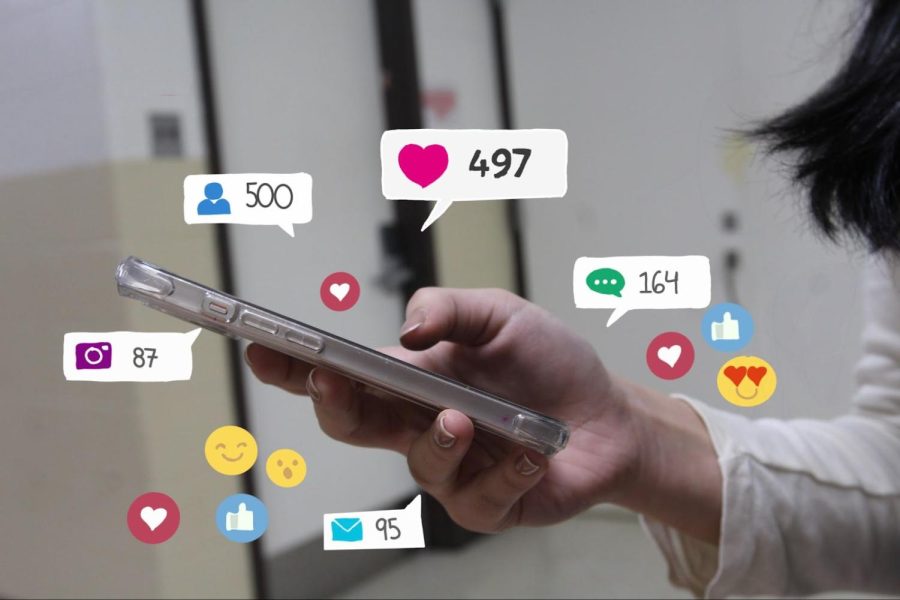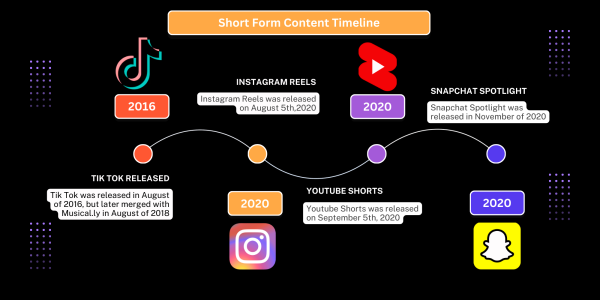Influencers: Promote or Deplatform?
In this age of technology, many of us spend most of our free time scrolling. It’s easy to wile away an evening looking at fun videos on TikTok or doom-scrolling on Twitter.
As we’ve grown more reliant on social media as a form of entertainment, influencers have grown more and more popular. While they can be perceived as positive trendsetters, placing these influencers on a pedestal can be polarizing and harmful, leading to a muddled view of the concept of influencers.
The Rise of Social Media Influencers
“One of the things I loved about passing periods was kids who didn’t know each other would get to know each other in class,” said psychology teacher Ms. Laura Brandt. “Now, 100% of the time, unless somebody has a question for me, [there’s] nothing, no interaction between students because everybody is on their phone.”
Alongside the rise of these apps has come influencers, defined by Merriam-Webster as a person who is able to generate interest in something by posting about it on social media.
The definition is simple, but the concept of the influencer has evolved beyond merely generating interest. Influencers play a role in many of our lives, helping to determine how we spend our free time, our political views, what products we buy and how we live.
Social media is designed to keep us hooked, and make all of us chase the dream our influencers have achieved.
“Every time someone likes [your] post on social media, it gives [you] a little dopamine blast, sort of like a chocolate does or people who win at gambling,” explained Ms. Brandt. “So we keep doing it over and over.”
Influencers have become an ingrained part of our society and they’re here to stay. However, possible negatives of the power they exert have been brought up.
The Negatives of Influencers
The rise of the influencer hasn’t lacked controversies. Influencers are often cited as polarizing, radicalizing and perpetuating unrealistic expectations.
“Comparing yourself to them [is a major concern],” wrote freshman Shagun Poonia. “Influencers [create content] on a topic they are experts on [and] probably practiced a lot, so you shouldn’t compare yourselves to them. I used to do this and it was not fun.”
Body image issues are a rising concern among Gen Z. A 2020 study in the Journal of Epidemiology & Community Health found that 61 percent of adolescents experienced some form of body dissatisfaction.
According to the New York Times, when asked about how social media impacted their body image, most students responded saying that it had a detrimental effect. This is paired with rising rates of eating disorders and body image issues in teenagers.
Freshman Calli Liu explained, “They could have seemingly perfect lives, and that can be detrimental to how you view yourself. You could start to compare yourself to the influencers.”
Another common criticism of influencers is their potential for political radicalization. Considering their young audience, influencers using their platform to promote questionable viewpoints could be concerning. Take, for example, Andrew Tate.
When asked who the most controversial influencers were in a DOI survey, nearly 30% of the 41 respondents directly mentioned Andrew Tate.
Tate, an internet celebrity who promotes hyper masculinity, is best known as a self-described misogynist. Some of his more infamous viewpoints include that women “belong in the home, can’t drive and are a man’s property,” according to the Guardian.
Tate’s social media accounts have been banned multiple times, and it’s hard to traverse the internet without finding at least one call for Tate to be deplatformed.
However, the presence of criticisms against Tate don’t change his influence over young men. He has been criticized for perpetuating toxic masculinity under the guise of luxury; his followers see his lifestyle as laudable and apply the same reverence to his views.
The same negatives of Tate can be applied to other influencers as well. Tate’s radicalization of young people happens through internet pipelines, where the more someone watches a certain subject, the more extreme video recommendations they get.
The Positives of Influencers:
It’s easy to look at influencers and denounce them as bringing nothing but harm, but that’s not the case. Just because certain influencers have a bad reputation doesn’t mean they should all be cast off.
One positive is that the concept of influencers and social media as a whole can theoretically make fame more accessible to people. You don’t have to be ultra rich or extremely talented to make it big.
Junior Abigail Dawes explained in a DOI survey that influencers can help with “the exposure of small businesses [or] creators.”
Another positive regarding body image is that social media influencers can promote a positive body image and self acceptance, according to Youth Entertainment Magazine; both of which are sorely needed nowadays. This could pose a contradiction, since influencers can promote a positive body image as well as perpetuate unrealistic expectations.
A large factor in the popularity of influencers is their capabilities for activism. Using their platform, many influencers have promoted their political views, typically centered on social justice issues of some sort.
“[Influencers] have power to voice problems due to their big platform,” stated Senior Payton Adams.
While this could be considered a negative, seeing as influencers often have young, impressionable followers, it can help to energize teens to get involved in social issues and care more about the world around them.
Junior Selin Dogan added to this idea, saying, “[Influencers] raise awareness to many topics. They can shine light to something you care about or post about something that makes you happy.”
Moving Forward:
Influencers have had both possible positive and negative impacts on our generation, but they’re not going anywhere. Popular influencers have become household names in the same way as musicians or pro athletes.
Social media can clearly be used as a positive influence, so it’s possible to appreciate the positives, while being conscious of the negatives.
The internet has expanded our worldview, and influencers are evidence of this. People are becoming famous for narrow fields of interest, bringing new voices into the limelight.
Influencers have platforms that reach myriad people, and their lives may seem glamorous and perfect, but we can’t idolize them. In the end, most influencers are regular people who gained a large following, so we need to take what they say with a grain of salt and develop our own beliefs.
Being addicted to our phones is very real and very much a problem. However, it’s a problem that can be solved.
“Do we like rewards?” asked Ms. Brandt. “Yes. Do we like to get likes? Yes. Can we get over that? Yes, but it takes effort to do that… You can do something called the Pomodoro method, which is to set a timer… do [your] tasks [and] don’t look at your phone. It seems monumental to some, but then you’re not distracted by your phone.”







